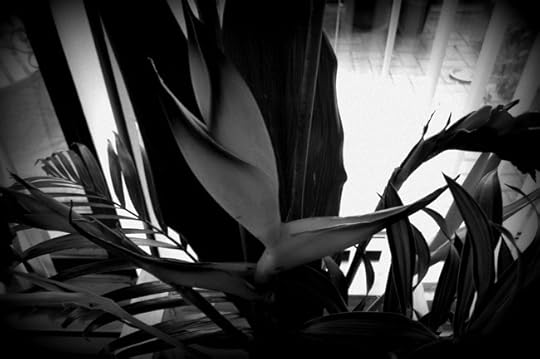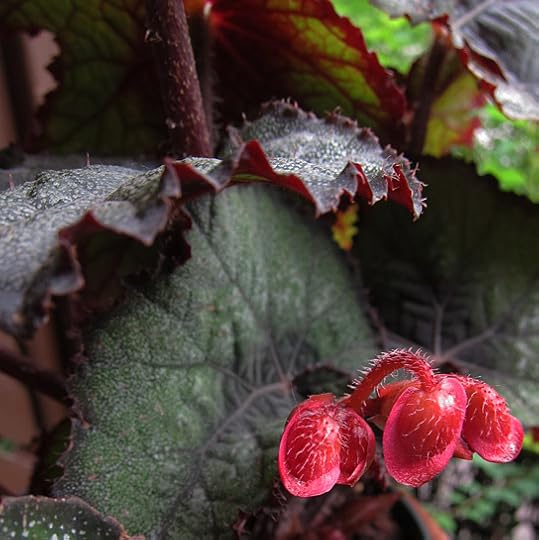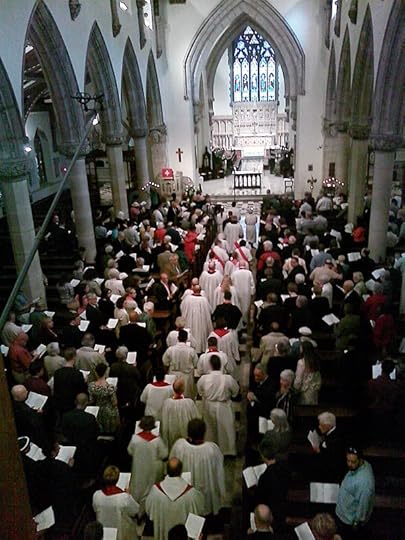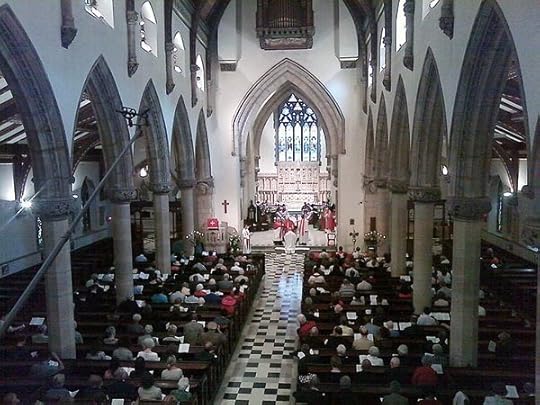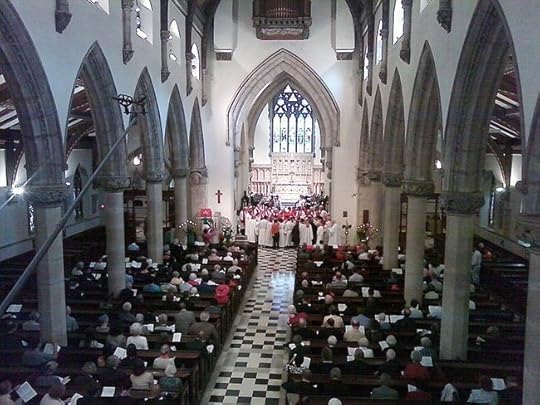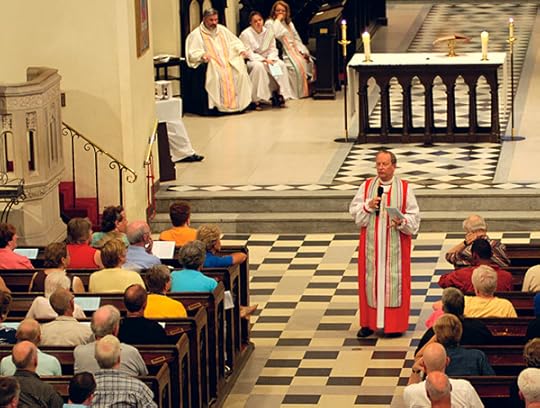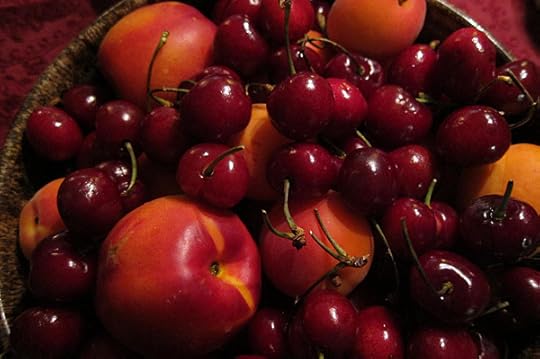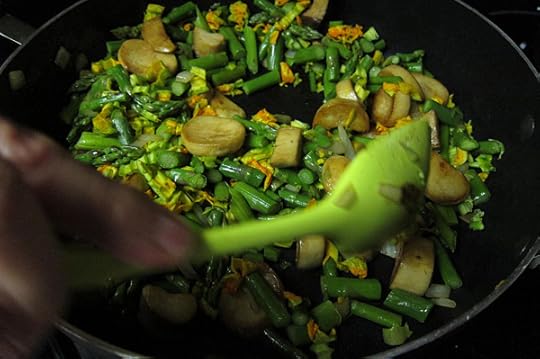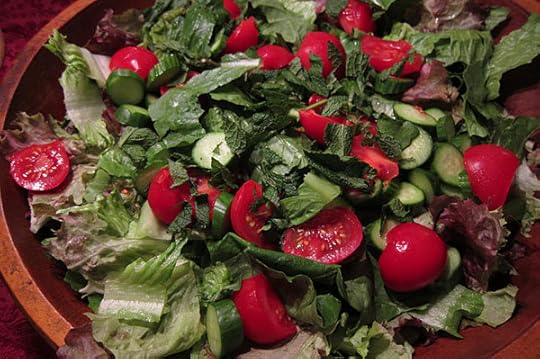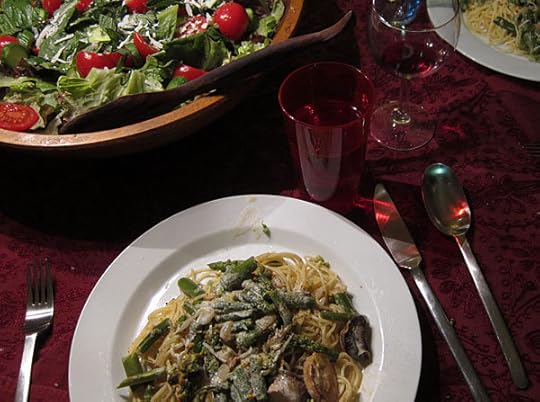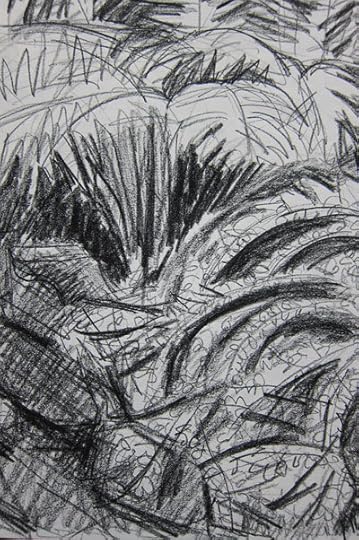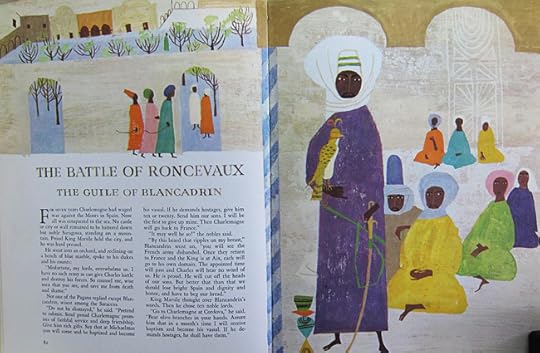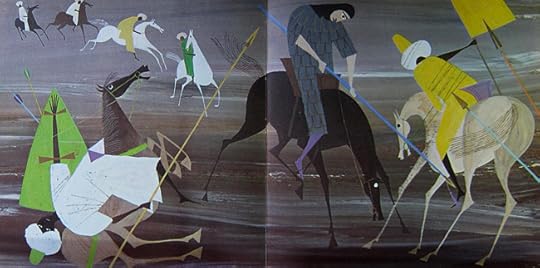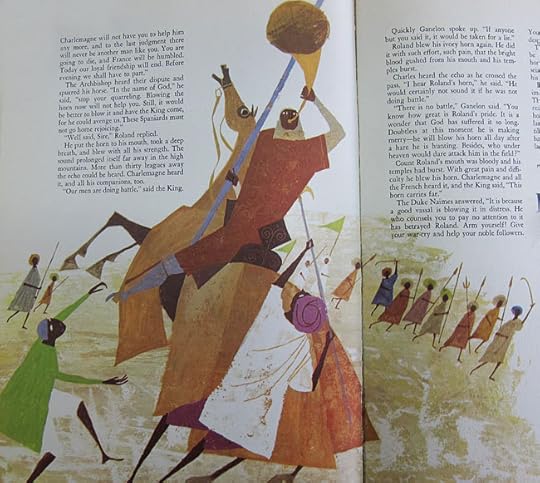Elizabeth Adams's Blog, page 97
June 9, 2012
Of Troy and Tenochtitlan
"after a number of years in the city, Hector married Susanna, the daughter of a disgraced army officer. She had auburn hair, a milky, delicate skin, and a profile like they engrave on coins. The first time he saw her she was wearing golden sandals. It as Hector's assurance that attracted Susanna. he was capable and daring. He was not, like her father, ridden with doubt. Even his bragging she considered as a kind of froth bubbling around his capabilities...one day he would take her away, she dreamed, from sprawling Troy to a nobler city such as Tenochtitlan, where nobody would have to handle anything except chalices and anointing oils and flowers, flowers..."
John Berger, Lilac and Flag
Tenochtitlan was a city-state located on an island in Lake Texcoco in the Valley of Mexico. Founded in 1325, it became the capital of the expanding Aztec Empire in the 15th century, until captured by the Spanish in 1521,,,today the ruins of Tenochtitlan are located in the central part of Mexico City.
Its name comes from tetl ("rock") and nochtli = "prickly pear"and means "Among the prickly pears [growing among] rocks".
Wikipedia
June 8, 2012
Claw
I took a number of photographs of this tropical bouquet today. This one, processed with a Holda-like filter, was the only one that came anywhere close to the strange, powerful, menacing beauty of the strong forms that I was after. I need to do some drawings before the flowers are gone.
June 6, 2012
Morning
On the cool terrace
begonias and trusting sparrows
make their plea for belief
in a benevolent world
and the simplicity of breadcrumbs.
June 5, 2012
An Ordination, and Some Memories
The clerical procession
Last Sunday, three of my friends were ordained at our cathedral: one to the diaconate, and two to the priesthood. I was in the loft, singing with the choir, and had a bird's-eye view of the processions and the proceedings (but unfortunately, only my camera phone in my pocket.)
An ordination is a momentous occasion, representing and celebrating many years of discernment, struggle, study, training and preparation. In liturgical traditions such as ours, the ordinand is taking solemn vows and receiving permission to do particular tasks. Deacons (the Greek word means "servant", "minister", or "messanger") are the church's eyes and ears and hands in the world; they also preach and assist at the mass. In most cases being ordained a deacon is the first step toward becoming a priest, which happens after another year, though some people feel called to the diaconate itself as a profession. In the case of priests, ordination means being able to perform all the sacraments such as baptism and marriage, and particularly, to "say mass" or celebrate the Eucharist.
I've known a lot of priests as good friends, and had a number of friends who have become priests during the time I've known them. Following and writing about Gene Robinson's journey from priest to his ordination as bishop gave me an additional window into the deeply personal journey this unusual and difficult path entails. Nobody takes it lightly, and an ordination always feels moving to me.
The candidate for deacon kneels alone at the altar.
The friends who were ordained on Sunday included a woman who is our present assistant at the cathedral, and two men, both of whom are openly gay and in committed relationships. Although such ordinations have been going on for some time in the U.S., this was the first ordination of an openly gay, non-celibate candidate to the priesthood in our diocese. Last year, when he was ordained a deacon, people rose and objected at the point in the service where the bishop asks if anyone feels there is "an impediment." This year, the bishop read a letter of objection he had received, but no one stood up in person , and the bishop calmly proceeded. When the ordinations were finished and the new deacon and priests presented, the congregation warmly applauded for many minutes; most of us have been involved in this struggle for years, and we recognized the moment for what it was.
The clergy gather to lay hands on the candidates for priesthood at the moment of ordination.
As I watched and listened and sang, I thought back to the time when there were no women priests -- in my childhood, women were not even allowed to read the lessons or to serve on the vestry. I thought of Gene Robinson's ordination, and his appearance at this cathedral for our first "OutMass" a year later -- of how packed it was, of the tears in the eyes of people who had never dared hope they would be accepted by a church because of their sexual orientation; men and women who had been shamed and rejected by the Roman Catholic church and denied communion, and community; people who had not taken communion for decades but did so that day as they listened, some weeping, to an openly gay bishop tell them they were loved by God just as they were, for that is how they had been created. That may have been the day, I think, that our bishop made the courageous decision to stand behind the ordination of gay men and women in our diocese, and soon formally accepted the candidacy of one of the men who was ordained last Sunday.
Bishop Gene Robinson preaches at the first OutMass, Christ Church Cathedral, Montreal, in the summer of 2006
For the most part, I feel the church and most congregations in North America, at least, are moving on. In England, there's still a huge and ridiculous debate over whether women are qualified to be bishops, and in other parts of the world the church still upholds laws that demonize and persecute homosexuals. Gene Robinson was utterly alone in the Anglican Communion for a number of years but now is no longer the only openly gay bishop to be elected. (He's also retiring this year.) The Catholic church is still embroiled in scandals over predatory, pedophile priests who did incalculable damage to children, and yet refuses to budge on the issues of ordaining women, or allowing priests to marry. I'm glad my denomination is less stuck, and tries to act with integrity, even as the church's relevance wanes, and glad I've been able to play a small part in the ongoing struggle for equality for all people.
June 4, 2012
An After-Market Dinner
Summer fruit
We had visitors last weekend -- two of J.'s cousins and their wives. As is often the case when Middle Eastern families get together, food played a central role in the weekend. On Thursday night we cooked for the travel-weary, arriving guests: two kinds of skewers (beef, and shrimp) with grilled peppers, onions, tomatoes; a green bean and tomato stew with Syrian spices; pilaf; salad; strawberries and brownies.
But the next day we took them all to the Jean-Talon market, and shopped for our dinner ourselves, then came home and cooked. It was simple but really delicious.
Chopped squash blossoms
Sautéing the squash blossoms in olive oil with onions, asparagus, and king oyster mushrooms.
Fresh baby artichoke hearts with grated parmesan. When we'd stripped off all the outer leaves, we felt like we had discarded so much of the artichokes themselves, but the resulting sauté was nutty and very delicious, totally unlike the frozen or canned version.
Tossed salad with small tomatoes, Lebanese cucumbers, and mint
And the sauce, finished with a little wine and cream, over pasta.
The tablecloth is a typical Syrian piece with chain-stitch embroidery (originally hand-worked but now done by machine) brought back from Damascus by my husband when he visited the city with his father and brother in 2000. No one talked much about current politics; it's too depressing and sad. But the men all expressed deep gratitude that their parents - three siblings - had been able to come to America. How grateful I am, too!
June 1, 2012
Manif
The extraordinary student mobilisation in Quebec has already sustained the longest and largest student strike in the history of North America, and it has already organised the single biggest act of civil disobedience in Canadian history. It is now rapidly growing into one of the most powerful and inventive anti-austerity campaigns anywhere in the world.
We have guests this weekend and I may be able to write much until Monday, but in the interim, I'd like to suggest this piece in today's Guardian, which describes what's been going on here and gives background on the student movement's aims and potential success. At 8:00 pm every night, people in my neighborhood start banging on pots, with no sign of the movement diminishing. Noise pollution is a big deal here, especially in French neighborhoods like ours, so this is an extraordinary gesture of both tolerance and solidarity; it doesn't go on for more than half an hour or so, but it's quite amazing. I went out the other night with a pot and walked around the block beating a rhythm, along with others who were either strolling or sititng on porches and balconies; the general feeling was one of exuberance and togetherness.
Marching with the students last Saturday was a high point in my life of protest: it was absolutely astounding, at 11:00 pm, to see not only this great throng of demontrators, but the people in their homes, in their cars, spilling out of restaurants, bars and cafes, all cheering, making noise, smiling, waving their arms, encouraging their children to join in. It was more like a parade than a protest march. The police, who seem to have largely given up on trying to enforce the draconian Loi 78, imposed by the Quebec government to make gatherings of more than 50 interdit without a permit, simply directed traffic, watched from streetcorners they had blocked off with their cars, and followed behind the demonstration on bikes and motorcycles. Their laissez-faire attitude was underscored for me when I saw one young woman, stark naked except for her boots and a red flag she was carrying, dancing up the middle of the parade, right past the police who didn't bat an eye! Of course, this is Montreal...
May 29, 2012
Deluge
As you've probably read or seen in the news, Montreal and Quebec are in the throes of a student protest that has drawn hundreds of thousands of demonstrators into the streets for more than 100 days. I've been wanting to write about this for you but it's such a complicated tangle of issues, an history, that I haven't yet found the time to do the subject justice in words. But it's still my intention, especially since many of the foreign news reports I've seen seem pretty far off the mark. On Saturday night Jonathan and I went out at 11:00 pm and joined the march as it went through our neighborhood: it was quite an experience. This video will give you the flavor of what's been going on:
Meanwhile, I'm working on my community garden, between thunderstorms, and on the next title forthcoming from Phoenicia, Claudia Serea's Angels & Beasts, a three-part collection of surrealistic prose poems from a very gifted Romanian-American author -- the book will be coming out in September.
Sunday, Pentecost, was another all-day affair for us singers, and full of fabulous music: a contemporary mass setting by Jonathan Dove in the morning, and some wonderful music by Herbert Howells in the afternoon. Between the two services and rehearsals, I helped facilitate a discussion within the cathedral community about the protests, our history, and our city, and what - if anything - we might offer as a response.
Yesterday I was pretty tired! But in the late afternoon we went to Pépinière Jasmin, up on Henri-Bourassa toward the western side of Montreal island, and I bought some plants...a white anemone, some delphinium and achillea, a hosta, and a hardy yellow rose, along with a bag of fumier de lapin: composted rabbit manure, highly recommended by the staff and apprently quite potent. And early this morning, after being woken at dawn by huge thunderclaps and then a torrential downpour, I went to the garden and worked...and worked...while the skies cleared, the earth rapidly heated up, and everybody and everything (including that rabbit manure) began to steam. Now, in the late afternoon, the skies have gotten absolutely black and the rain is starting again.
It's time, I think, to go home and pour a glass of wine.
May 25, 2012
Garden Forms
After doing a quick drawing today, of a corner of my studio, I leafed through the pages of the rather old sketchbook. This drawing caught my eye. It was obviously done years ago in my Vermont garden, which was full of ferns, and I guess at the time I didn't think it was very successful. But today I loved the energy of the lines, the interplay of the forms, and could see all kinds of possibilities lurking in that foliage for a relief print. (Note to self: search out your forms with blunt, chunky objects, not those sharply pointed ones you seem to prefer...)
It's odd, isn't it, how we change, and how it's sometimes so hard to see the potential of a creative idea or expression at the time. A good argument for keeping sketchbooks and notebooks of poetry and writing, and actually going back through them once in a while!
May 23, 2012
A Particular Stone
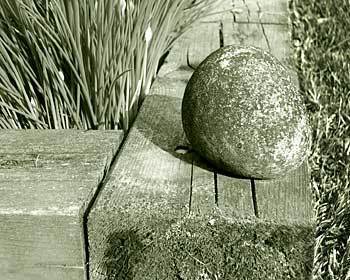
I'm thinking about my dear mother today, May 23. It's been six years.
Looking back at the posts I wrote here around the time of her death, I found this photograph and these poems, sent by my friend who was then blogging under the name of Abdul-Walid. They felt like just as much of a gift today as when I received them six years ago. Here's the photograph, and what I wrote then.
That cobblestone has come with me to Montreal now, and it's in my garden, where I went very early this morning to spend some quiet time. When I pick the stone up, I think of it in her hand.
---
The Cassandra Pages, June 5, 2006: "The former blogger known as Abdul-Walid recently sent two poems which I am pleased to publish here. The photograph was taken last week. I had been thinking about the poems and wondering about a suitable image: rocks wouldn't do, and not just any stone. After my mother died, the people who live around the same lake sent two beautiful rose plants to the house in her memory. I went out to the garden to plant them. On the four corners of the raised bed I noticed that my mother had placed four stones - all round cobblestones, similar to this one, tumbled and rolled under the glacier which once scoured our area of central New York. They are so numerous that some local houses and barns even have cobblestone facings or foundations. This was the best one: inscrutable, enigmatic, beckoning."
EVEN A STONE
Even a stone
is too wonderful
for me.
But I must
begin somewhere.
There are days
when a stone is all
I can meet, it alone,
or at most a poem
into which
its secret has
been poured. But
even a stone
is too wonderful
for me,
even there
I cannot
begin.
----
TO A STONE
Final,
ground's eye,
confide in me.
Let me not be
like those who say:
“the sky is blue.”
Enough with
this describing.
What you have hidden
you have hidden.
Ferns, horses,
people, gods
have all gone
another open way.
But don’t say a word:
I couldn’t bear it
were you, too,
to mar this small
longed-for
silence.
--Abdul-Walid
May 20, 2012
Roncevaux
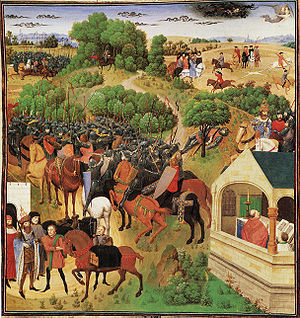 I've been reading Cees Nooteboom's Roads to Santiago, which chronicles the Dutch writer's circuitous pilgrimage (by car) through Spain, less in search of spiritual favors than for the spirits of Cervantes, Zurbarán, Velasquez, Romanesque churches and Cistercian monasteries, tiny villages hung in mountain valleys, virtually unchanged since the Middle Ages. One of the places he visits is the town of Roncesvalles, home of the Abbey of Roncevaux. I love both of those words, which you just have to say aloud: -- Roncevaux, Roncesvalles -- but it took me a while to remember that this is the place where, in 778, the Moors attacked and destroyed the rear guard of Charlemagne's army, while the king and the rest of his army went on ahead bearing treasure and promises of fialty and Christian conversion they had received from the last Moorish stronghold, Saragossa. The promises were a trick, and all the remaining French were lost, partly because the knight Roland refused to signal Charlemagne in time. The great battle was commemorated in one of the earliest works of French literature, The Song of Roland.
I've been reading Cees Nooteboom's Roads to Santiago, which chronicles the Dutch writer's circuitous pilgrimage (by car) through Spain, less in search of spiritual favors than for the spirits of Cervantes, Zurbarán, Velasquez, Romanesque churches and Cistercian monasteries, tiny villages hung in mountain valleys, virtually unchanged since the Middle Ages. One of the places he visits is the town of Roncesvalles, home of the Abbey of Roncevaux. I love both of those words, which you just have to say aloud: -- Roncevaux, Roncesvalles -- but it took me a while to remember that this is the place where, in 778, the Moors attacked and destroyed the rear guard of Charlemagne's army, while the king and the rest of his army went on ahead bearing treasure and promises of fialty and Christian conversion they had received from the last Moorish stronghold, Saragossa. The promises were a trick, and all the remaining French were lost, partly because the knight Roland refused to signal Charlemagne in time. The great battle was commemorated in one of the earliest works of French literature, The Song of Roland.
Then, a few mornings ago, I was catching up on Lucy's blog, Box Elder, and saw that she had just been there, in Basque country! That was too much of a coincidence, so today I did some research, and downloaded The Song of Roland to read, as well as some of the best images that have been painted of the battle. I haven't yet read the whole thing, but in spite of the power of the epic I found myself aghast at its blatant, Crusader-like message of "Christians are right, Muslims are wrong -- and pagan -- and therefore deserve to die." Of course, the battle took a different course on that day, but one wonders if the world has advanced very much.
My favorites illustrations of the story, though, -- and this is probably what jogged my memory -- are those from The Golden Treasury of Myths and Legends, one of my most-beloved books from childhood, by Alice and Martin Provensen, whose work is much admired by me and by Clive Hicks-Jenkins. I can still remember my mother reading me this story at my bedside, and hear her repeating, "Roland! Blow your horn!" As a fledgling musician, I think I was particularly struck by the idea that someone could blow a horn until their temples burst. But such is the stuff of legend.
Li quens Rollant, par peine e par ahans,
Par grant dulor sunet sun olifan.
Par mi la buche en salt fors li cler sancs.
De sun cervel le temple en est rumpant.
Del corn qu'il tient l'oiïe en est mult grant:
Karles l'entent, ki est as porz passant.
Naimes li duc l'oïd, si l'escultent li Franc.
The Count Rollanz, with sorrow and with pangs,
And with great pain sounded his olifant:
Out of his mouth the clear blood leaped and ran,
About his brain the very temples cracked.
Loud is its voice, that horn he holds in hand;
Charles hath heard, where in the pass he stands,
And Neimes hears, and listen all the Franks.

